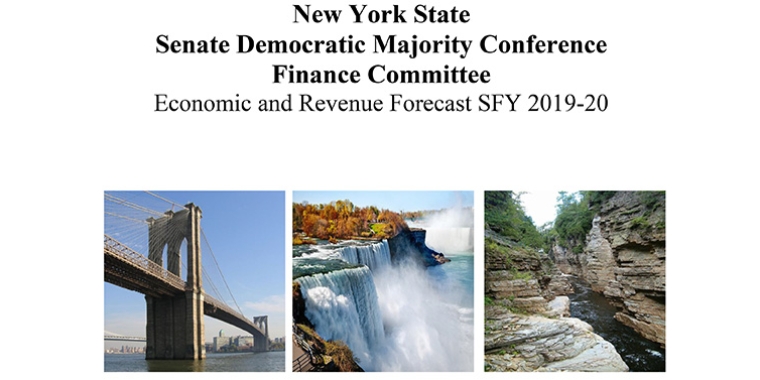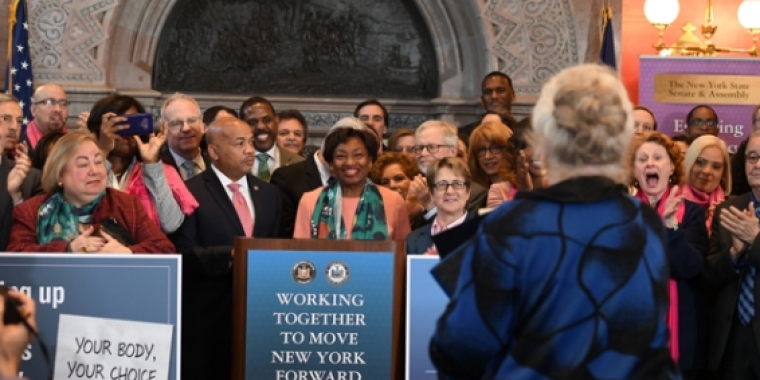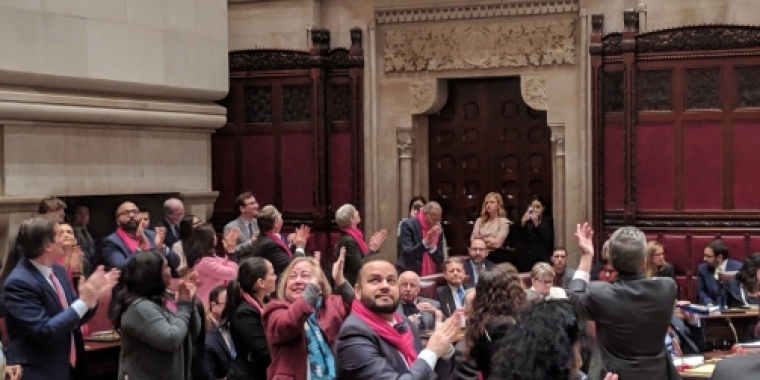
Testimony Before the Metropolitan Transportation Authority (MTA) Regarding the Proposed Fare Increases and the Closure of Token Booths on November 4th, 2004
Liz Krueger
July 12, 2010
My name is Liz Krueger and I am the State Senator for the 26th Senate District representing the East Side of Manhattan and Midtown. I am here today to state my grave concerns regarding the MTA’s recent proposals to close 164 token booths and increase the cost of metrocards for weekly and monthly riders. While these cuts are indeed unconscionable, they are also the inevitable consequence of a failed, decades long approach of under funding public transportation and balancing the MTA’s budget on the backs of working New Yorkers.
The last decade has represented a remarkable turnaround in transportation trends, as ridership on subways and buses have risen dramatically and shed their 1980s image of danger and dysfunction. The MTA focused on enhancing service reliability and personal safety, spending public investments on new subway cars and buses, track replacement and station renovations. New Yorkers responded by embracing public transportation, with subway ridership increasing 24% and bus ridership increasing 27% in the 1990s. This development has been wonderful for the economy, environment, and the quality of life for all New Yorkers.
While service and cleanliness improved, it did so at the expense of financial responsibility and has imperiled the system’s long-term fiscal health. The Board of the MTA, which is appointed by the Governor, did not aggressively seek increased state, city or federal aid, and they did not successfully push for increased or additional dedicated revenue streams. City and state officials were not forthcoming with new monies to finance the ambitious reconstruction of the system, but were quite happy to claim responsibility for the turnaround. The rebuilding of the subway was financed through debt and has jeopardized its current “state of good repair” as well as direly needed expansion projects such as the Second Avenue Subway and East Side Access.
A major source of the authorities current fiscal problems can be traced to the lack of city and state funding to the MTA’s capital budget. The capital plan was established in response to the poor state of the subway as seen in the 1980s. At its inception, the state recognized the need for adequate public funding and contributed $1.5 Billion, or 19% of the total capital budget with the city contributing 7%. State and city contributions to the capital budget has decreased markedly over the past twenty-five years, and by 2000, the state contributed nothing and the city contributed only 2%. Undeterred, the MTA pressed forward with its almost $20 Billion plan, financing the difference with debt.
While few doubt the necessity of the capital budget, payment on debt service is out of control. The M.T.A. paid 12% of its $9 Billion budget to debt service in 2004 alone. If the current capital budget is approved without major assistance from the city or state, the MTA will be paying 20% from its general operating funds in 2008 simply to pay off the interest that has accrued on the debt. The current system is completely untenable and will result in service decreases and fair increases as far as the eye can see.
Fortunately, advocacy groups, fiscal watchdogs, and other elected officials have made several common sense proposals, which, if implemented, should put the MTA on the path towards fiscal responsibility.
First, the state and the city must recommit itself to investing in public transportation through the general operating fund of the MTA and through increased contributions to the next and future capital budgets. The whole notion of public transportation is predicated on the assumption that government contributes enough to keep service on track and the fares reasonable. New Yorkers already contribute a higher percentage of their fairs and tolls to the operating and capital funds than in most other public transportation systems. The currently proposed capital budget, which I fully support, has an estimated gap of $15 Billion. It is imperative that the city and state make this investment to the region through government contributions. We must recommit ourselves to a true system of “public transportation,” one that is adequately supported by the government for the benefit of its riders.
Second, we must implement increases in current dedicated revenue streams and explore new opportunities for dedicated revenue. In enacting this funding, we must ensure that measures are included which guarantee that these streams serve the purpose of their intention. Currently, tax supported revenue provides the MTA with its third largest source of revenue, with $2 Billion supporting the MTA in FY2004. Groups such as the Fiscal Policy Institute and the NYC Independent Budget Office, among others, have suggested various increases and new tax-based revenue streams which must be seriously considered.
Finally, we must ensure that any increase in funds are used wisely and also push to have greater accountability and oversight over the M.T.A.’s budget process and operations. Reform is the new buzzword in the state capitol, and we should apply the voters desires for reform to every aspect of our state’s government whether it be legislative rules, campaign finance or the operations of the public authorities. Too many anecdotal and substantive pieces have been documented over the years for us to assume that the authorities current problems are completely due to lack of funding. I have cosponsored a bill in the State Senate, introduced by Senate Democratic Leader David Paterson, that would require better reporting of financial data by the MTA and hope to work with my Senate colleagues this year to pass meaningful reform.
Unfortunately, the failed system of negligent transportation funding at the state and city level has led to a situation where we are asking riders to pay more for less.
The MTA has proposed an increase in the weekly metrocards from $21 to $24 and the monthly cards from $70 to $76. Not only will these fair increases hurt New Yorkers still struggling through an under performing economy and recovering from the last fair hike, but it will also further incentivize the use of personal automobiles and taxis, clogging our streets and polluting our environment. Finally, it is clear that even if this fair hike is passed, the operating budget for 2006 will contain an even greater budget gap than 2005. State and city officials must act now to contain these out of control budget gaps which burden working New Yorkers and damage the environment.
The authority has also proposed the permanent and part time closures of 164 token booths. Times Square and Grand Central Station, the busiest stations in the network, and once symbols of the deterioration of safety in the system will lose 7 token booths. While officials at the MTA claim that the introduction of metrocards makes these clerks unnecessary, token booth clerks are essential to maintaining the current level of safety enjoyed in the subways.
Over the next few years, our region and its leaders face a critical choice, which will have huge impacts on the future of our state. The first path, advocated by the Governor and others, redefines the definition of public transportation by placing burden of subway operations on the rider through increased fairs. The second path, advocated by myself and others, sees public transportation as a truly “public” investment with benefits for all. These benefits include immediate relief from never ending fair hikes and a sense of security for residents, commuters and tourists through the maintenance of token booth clerks. This path recognizes the environmental hazards of further disincentives to subway ridership and the need to keep the state’s economic engine moving with quality, reasonably priced transportation. I will continue to work with my colleagues in the Senate to push for greater public investment in transportation and urge others to do the same. Thank you for the opportunity to testify.
Share this Article or Press Release
Newsroom
Go to Newsroom
Sen. Krueger And Assm. Ortiz Respond To Comptroller On Divestment
February 26, 2019


Senator Krueger's Community Bulletin - February 2019
February 6, 2019
